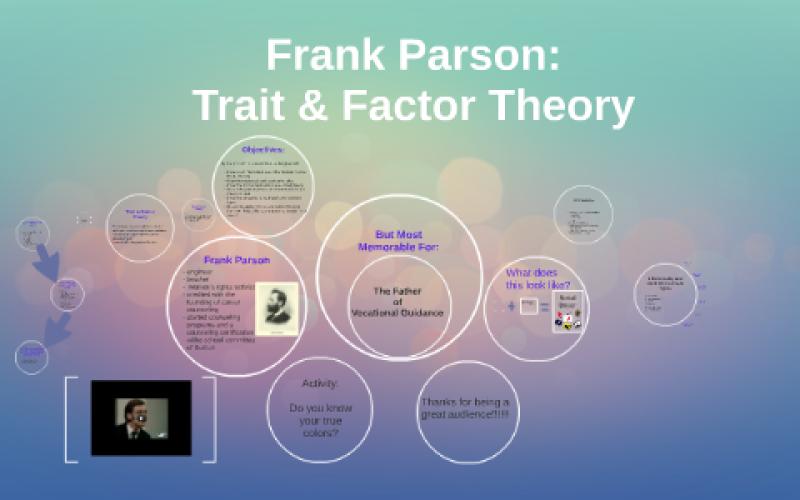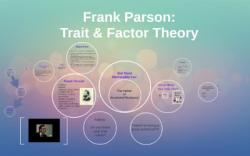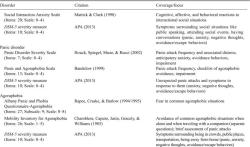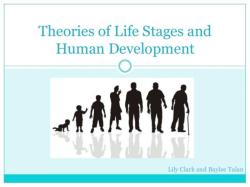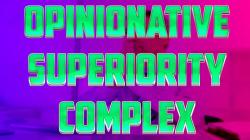What is the "trait and factor theory" in counseling?
The Trait and Factor Theory, also known as the Trait-Factor Theory, is a career development theory that has been influential in the field of vocational counseling. This theory, developed by Frank Parsons, is based on the premise that there are certain traits and factors that are essential for success in specific occupations, and individuals can make satisfying career choices by matching their traits with the factors of occupations.
Key concepts and components of the Trait and Factor Theory include:
Traits:
- The theory suggests that individuals have unique traits, including abilities, interests, values, and personality characteristics. These traits influence an individual's aptitude for and satisfaction in particular occupations.
Factors:
- Factors refer to the characteristics and requirements of occupations. These include the skills and knowledge needed for success in a specific job, as well as the conditions and demands of the work environment.
Matching:
- The central idea of the Trait and Factor Theory is that individuals will be most satisfied and successful in their careers when there is a good match between their personal traits and the factors associated with a particular occupation. This matching process is often referred to as "matching aptitude with environment."
Counselor's Role:
- According to the Trait and Factor Theory, the role of the career counselor is to assist individuals in identifying their unique traits through assessments, interviews, and self-reflection. The counselor then helps the individual explore and understand the factors associated with various occupations.
Occupational Information:
- Career counselors using this theory provide individuals with accurate and up-to-date information about occupations. This includes details about job duties, required skills and education, working conditions, and opportunities for advancement.
Decision-Making Process:
- The career decision-making process involves a series of steps, including self-assessment, exploration of occupational options, and making informed choices. The counselor guides the individual through this process, emphasizing the importance of aligning personal traits with occupational factors.
Realistic Goal Setting:
- The Trait and Factor Theory promotes the setting of realistic and achievable career goals based on a thorough understanding of individual traits and the demands of chosen occupations.
Life-Long Career Development:
- The theory recognizes that career development is a life-long process. Individuals may revisit and revise their career goals as they acquire new skills, interests, and experiences.
It's important to note that while the Trait and Factor Theory has been influential, contemporary career development theories have expanded beyond the trait and factor model. Current approaches often incorporate broader factors such as social and cultural influences, life roles, and the importance of adaptability in a rapidly changing work environment.
How is the "trait and factor theory" applied within the framework of counseling or therapy?
Trait and factor theory, also known as person-environment fit theory or trait-factor theory, is a psychological framework that emphasizes the importance of matching an individual's traits and abilities with the demands of a particular environment or situation. In the context of counseling or therapy, trait and factor theory is often used to help individuals achieve greater career satisfaction and overall well-being by aligning their personal characteristics with suitable career paths or life choices.
Core Principles of Trait and Factor Theory in Counseling:
Identifying Individual Traits and Abilities: Counseling professionals assess clients' personality traits, interests, values, skills, and knowledge to understand their unique strengths and preferences.
Analyzing Environmental Demands: Counselors gather information about the characteristics and requirements of various occupations or life situations. This may involve researching job descriptions, interviewing professionals in different fields, and understanding the social and cultural factors that influence different environments.
Matching Traits and Factors: By comparing an individual's traits and abilities to the demands of specific environments, counselors can identify potential areas of fit and potential mismatches. This helps clients make informed decisions about career paths, educational pursuits, or lifestyle choices that align with their personal strengths and preferences.
Applications of Trait and Factor Theory in Counseling:
Career Counseling: Trait and factor theory is widely used in career counseling to help individuals make informed career decisions. Counselors use assessments and interviews to identify clients' interests, values, skills, and personality traits. They then match these characteristics to potential career paths that align with the individual's preferences and abilities.
Educational Counseling: Trait and factor theory can also be applied in educational counseling to help students choose appropriate academic programs and extracurricular activities. Counselors assess students' interests, learning styles, and academic strengths to identify suitable educational paths that align with their individual needs and aspirations.
Relationship Counseling: Trait and factor theory can be used in relationship counseling to help couples understand their compatibility and identify potential areas of conflict. Counselors assess couples' communication styles, conflict resolution skills, and personal values to identify areas of strength and potential challenges in their relationship.
Personal Development Counseling: Trait and factor theory can be used in personal development counseling to help individuals enhance their self-awareness and make informed decisions about their personal and professional lives. Counselors help clients identify their unique strengths, values, and aspirations, and then guide them in making choices that align with their authentic selves.
Limitations of Trait and Factor Theory:
Oversimplification of Individual Characteristics: Trait and factor theory can sometimes oversimplify individual characteristics, potentially overlooking the complexities and nuances of personality and behavior.
Dynamic Nature of Environments: Environments and their demands can change over time, making it challenging to provide static assessments of fit.
Individual Resilience and Adaptability: Individuals may have the ability to adapt to environments that are not considered ideal matches, suggesting that fit is not a deterministic factor.
Despite these limitations, trait and factor theory remains a valuable framework for understanding individual differences and their potential influence on personal and professional outcomes. When used in conjunction with other counseling approaches and assessments, trait and factor theory can provide valuable insights for helping individuals make informed decisions and achieve greater satisfaction in their lives.
